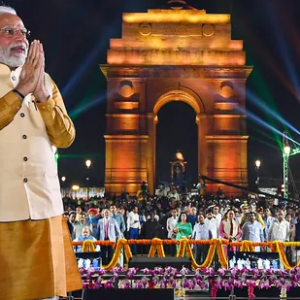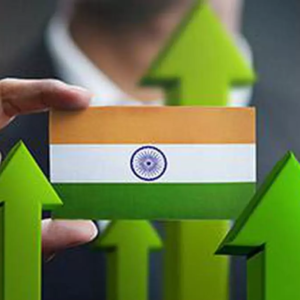The International Solar Alliance aptly demonstrates the value of soft power in the pursuit of a specific initiative. It is India’s chance to lead the climate change challenge
The distribution of global power is rapidly evolving, precipitating far-reaching economic and political changes affecting nations of every size and standing, reads the introductory sentence of the The Soft Power 30 report of 2015. This comment aptly summarises the underlying power of the International Solar Alliance (ISA), a brainchild of India, that was launched along with France at the COP21 United Nations Climate Change Conference in Paris in 2015.
In just three years, the alliance has become a reality, a quick progression, generally unseen in the diplomatic community. India along with France has created an international treaty-based intergovernmental organisation that may affect the world order, at least in terms of energy and create a new developmental model.
The alliance, according to the Paris Declaration on the International Solar Alliance, is open to membership from 121 solar resource-rich countries that lie fully or partially between the Tropic of Cancer and the Tropic of Capricorn. Membership is on a voluntary basis with no targets or legal obligations imposed on member countries and is based solely on shared collective goals.
Unlike hard power, whose stratagem focuses on military intervention, coercive diplomacy and economic sanctions to achieve international objectives, the International Solar Alliance eschews traditional foreign policy tools of the carrot (reward and punishment to induce desired behaviour) and the stick (coercion), emphasising instead on using its network, attractiveness and appeal to persuade and draw member nations into its structure. India, sitting in the driver’s seat of this alliance, has the power to both steer the organisation and frame the agenda.
If hard power is push, soft power is pull; and India has pulled over 60 countries to the founding summit of the International Solar Alliance hosted in New Delhi. It is interesting to note that French President Emmanuel Macron’s maiden visit to India signalled stronger cooperation between the two nations.
Joseph Nye, a proponent of soft power, contends that a nation can increase its soft power through engaging, informing and influencing the Governments and citizens of other countries. Drawing from this argument, India can advance its soft power status through the International Solar Alliance in three possible ways.
First, a majority of the potential members of the International Solar Alliance are developing countries with large agrarian populations who face similar challenges like energy deficiency and are in need for a stronger voice in the international community.
The alliance will give these nations a voice and act as a platform to share experiences and narrow technological gaps through cooperation and increased engagement between Governments, businesses and the citizenry. India will also be instrumental in shaping the International Solar Alliance’s agenda as it houses the Secretariat and is a member of the steering committee — two factors that will raise India’s soft power.
Second, India, along with France, is driving the “world’s largest renewable energy expansion programme”, that will help transform the lives of people through simple devices like solar lanterns, cookers, water pumps and solar street lights. This soft, relatively cheaper and sustainable approach provides a positive development pathway. This may be done by skilling people and utilising indigenous renewable resources for industrialisation and employment generation.
Western nations benefited from a cheap carbon-based economy to fuel their development, ushering in improvements in productivity, income and standard of living. However, the model is clearly not sustainable and the world is witnessing the ill-effects of a carbon-economy such as deforestation and climate change.
Today, the International Solar Alliance can be an enabler and act as a launch pad for nations to reap the same benefits from renewable energy, but through a better and sustainable model. It can, therefore, be argued that this is an initiative that serves to demonstrate the value of soft power in the pursuit of a specific initiative. It is India’s chance at climate leadership.
Third, the International Solar Alliance will seek to achieve the seventh UNDP Sustainable Development Goal (SDG) to “ensure access to affordable, reliable, sustainable and modern energy for all” by enhancing international cooperation, upgrading technology, promoting investment and increasing infrastructure by 2030. India has assumed a leadership role and has successfully created an organisation that aims to tackle this important universal goal.
In fact, the International Solar Alliance is the only agency under the United Nations system that is working on achieving these goals, giving India an opportunity to demonstrate its leadership capacity, especially in the developing world. The appeal of India’s soft power rests in its promise to deliver key international objectives without high costs and unpopularity associated with hard power.
India has attracted the attention of the West and central African nations such as Nigera, Ghana, Gabon and Sudan, with whom it has traditionally not shared deep-rooted ties as it does with some east African countries such as Kenya and Zanzibar. India can use the International Solar Alliance as a strategic, monetary and knowledge transfer platform to smartly counterbalance other nation’s aggressive and growing presence in the African continent.
In this summit, India has extended a $1.4 billion Line of Credit to support 27 projects in 15 countries, of which 23 projects are in African nations. The summit witnessed the participation of 60 countries, 23 of whom were represented by Heads of States, indicating the keenness of nations to be a part of this new alliance.
The success of this alliance in part hinges on India and France’s credibility and willingness to take the International Solar Alliance forward. India, for its part, has demonstrated both. Its commitment to solar energy is evident from the increase in installed solar power capacity from three gigawatts in 2014 to 20 GW in 2017, as reported by Bridge to India.
Moreover, India also played a crucial role in according the status of a treaty-based international intergovernmental organisation to the International Solar Alliance.
Finally, the summit also signalled India’s ability to engage with and attract global audiences and is proof that India has developed and communicated a compelling narrative, established an international norm and drew on key resources to allure one country to another.
Indeed, this approach is soft, long-term and tangible: It is smart power at play.
The author is a Research Fellow at the India Foundation. The views expressed above belong to the author(s). This article originally appeared in The Pioneer on 15 March, 2018.
References:
1. https://www.business.com/articles/the-impact-of-green-energy-on-the-economy/
2.http://www.world-nuclear.org/information-library/current-and-future-generation/world-energy-needs-and-nuclear-power.aspx
3.http://ourrenewablefuture.org/chapter-8/
4.https://www.e-ir.info/2014/05/14/the-effectiveness-of-soft-hard-power-in-contemporary-international-relations/
5.https://portland-communications.com/pdf/The-Soft-Power_30.pdf




I am getting more related predict points and good methods from your post. The study related matters are discussed with your post. I am very happy to get more information and also technical aspects are accepted for the readers. The points are great to be accepted and getting full of analysis also. The medicine and science is my favorite subject. The knowledge and skills will be developed.